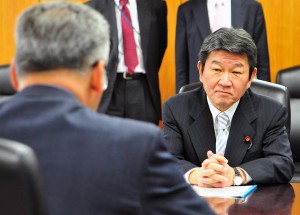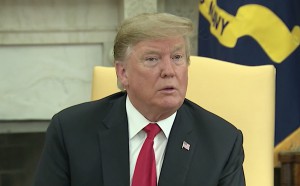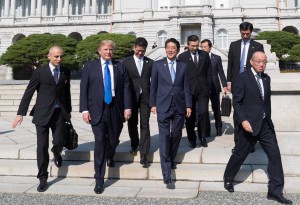
Toshimitsu Motegi, Japan's top economic negotiator, said the country would not accept quotas on how many vehicles it ships to the United States.
Japan’s top trade negotiator says he does not believe the U.S. will impose any kind of numerical quotas on the exports of Japanese made vehicles to the United States.
There is no need to be worried that the United States will impose a quota on Japanese automobile imports, economic revitalization minister Toshimitsu Motegi said Sunday.
“There is no worry judging from the U.S. announcement,” Motegi said on a television program in Japan. He noted that such a quota was not specified in the announcement.
However, other Japanese media. Including the Ashai Shimbun, one of Japan’s most important newspapers observed that President Donald Trump had placed the question of quotas front and center in future bi-lateral trade talks between Japan and the United States, which are in offing during the next six months.
(U.S. ending steel, aluminum tariffs on Mexico, Canada. Click Here for the story.)
Last week, facing pressure from a number of quarters on the growing confrontation with China on trade issues, Trump postponed a decision on whether to impose additional tariffs on automobile and auto parts imports by up to six months from Europe and Japan. He also agreed to lift tariffs on Mexican- and Canadian-made steel and aluminum that added costs to the cars from General Motors, Ford and Fiat Chrysler.

The Trump administration agreed to lift the steel and aluminum tariffs on Mexico and Canada in order to keep out Chinese steel.
Trump, despite the short- or even-medium term economic pain, believes that trade has become a winning political issue with voters as he campaigns for re-election in 2020 because of American fears of foreign completion and the sense among many American that they have been shut out of the gains and benefits created by the global economy.
On Friday, Trump, in comments that set off the furor in Japan, said he agreed with the conclusions of his Commerce Department, which investigated imports of vehicles and auto parts and found they harmed national security by causing a declining market share for “American-owned” carmakers since the 1980s. The White House set a 180-day deadline for negotiating deals with Japan, the European Union and other major auto exporters.
Motegi, however, said that Japan does not believe quotas are necessary. “We have told (the United States) that we oppose trade-distorting measures including a quota,” Motegi said, stressing that he has secured the United States’ assurances it will not take such measures.
(Click Here to see Toyota’s CEO say he’s “sad” about being considered a security threat.)
Asked whether Japan will be able to avoid a U.S. import quota after bilateral negotiations on trade, he told reporters after the TV program that it depends on how the accord is worked out. Motegi represents Japan in the trade talks.
Despite concerns over a downturn in the Japanese economy, Motegi said on the program that he sees no need at present to draw up additional economic stimulus measures in light of the planned consumption tax hike in October. Automobiles and auto parts accounted for about 75% of the U.S. trade deficit as of 2017.
Meanwhile, Toyota Motor Corp. rebuked Trump’s declaration that imported cars threaten national security, signaling contentious talks are ahead for the White House and America’s key trading partners.
Japan’s largest automaker said Trump’s proclamation Friday that the U.S. needs to defend itself against foreign cars and components “sends a message to Toyota that our investments are not welcomed.” The company said it has spent more than $60 billion building operations in the country, including 10 manufacturing plants.
(Tariff talk put on hold for six months by Trump administration. Click Here for the story.)
Toyota said it remains hopeful those talks can be resolved quickly, but warned that curbing imports would force U.S. consumers to pay more and would be counterproductive for jobs and the economy. The company’s critique comes two months after its pledge to add $3 billion to a years-long U.S. investment plan.

